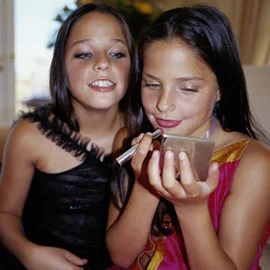Understanding Tweens
Where did the time go? It may seem like just yesterday your child was learning to read, playing with dolls, and eager to hold your hand in public. Now you get an eye-roll and a sigh every time you talk. Suddenly, your child is acting like a teenager. You thought you had several years before the teen attitude kicked in. What happened?
Rise of the “Tween”
The teenage years are commonly dreaded by parents as a time when they can expect their once sweet child to become argumentative, moody, and difficult to manage. While the terms “adolescent” and “teenager” are often used interchangeably, they do not always exactly coincide. In fact, in the past few decades arguments have been made that adolescence lasts well into the twenties for many people.
Just as adolescence appears to be lasting longer, it also seems to be starting earlier. This is true for both the physical and behavioral changes of adolescence. Recent years have seen the development of a new in-between group: “tweens." Tweens are usually eight to twelve years-old. Biological, social, and cultural influences have all contributed to the rise of the tween as a distinct group.
Biologically, puberty is starting earlier (a process known as The Secular Trend.) Social and cultural factors include marketing and advertising geared toward this age group that encourage more mature behaviors and interests and the pull to fit in with peers as friendships begin to take precedence over family relationships.
These factors have combined as well as separate impacts on development, resulting in wide variation among children in this age range, with some remaining very childlike, and others seeming to turn into teenagers almost overnight. No longer children, and not yet teenagers, tweens often present with a confusing, and sometimes disturbing, combination of child-like and adult or teenager-like behaviors.
Taking Perspective
Early in my career, I ran a social skills group for eight to ten year old girls. One of the girls in the group was clearly a tween. She looked and acted more like a teenager than the other girls. She carried a purse, wore lip gloss, and talked about how much she loved the latest teen heartthrob. And she challenged my authority from day one.
It soon became clear that I was not the only person she challenged; her parents went out of their way to warn me about how difficult and manipulative their daughter was. This warning helped me to see my tween group member in a different light, which in turn led me to a different approach in my interactions with her. I realized that she probably received a lot of negative attention in her environment and was likely not taken seriously.
So I started to listen to her and used a more flexible approach to dealing with her. I dropped my "because I'm the doctor/adult and I said so" attitude. I compromised. This does not mean I let her take over; there were still rules. But once she felt like she mattered and her opinion counted, she was willing to compromise, too. She opened up, and by the last group session, I was sad to see her go. Despite her initially difficult presentation, she contributed a lot to the group and genuinely seemed to care about the other group members. Deep down, she was still a child who was hungry for positive attention—wherever she could get it.
Parents often mistakenly believe that once their child begins to act like a teenager, all is lost. Not so! With the right tools and a different outlook on your child’s behavior, you can learn to enjoy life during the tween years and beyond.
What You Can Do
Learn to talk, and listen, to your tween. Try to avoid judging or criticizing. You might be surprised what you learn!
Have rules, but be willing to compromise on some details. Practice problem solving to look for solutions you can both live with.
Look for opportunities to give your tween attention for positive behaviors.
Remember that, even though tweens try act like an adults, they don’t really think like adults; they still have immature brains and a lot of cognitive development ahead of them.
Remember, every developmental stage brings it's own unique set of challenges, and the tween years are no exception. While it can be sad to see one stage end, it can also be exciting to see the next unfold. With patience and understanding, you can learn to love interactions with your tween.
For information on parenting therapy, click here.

